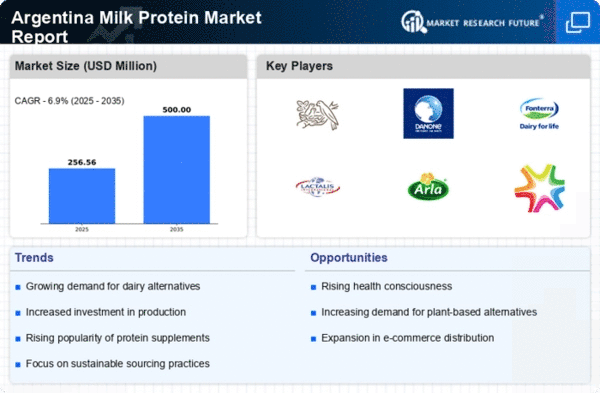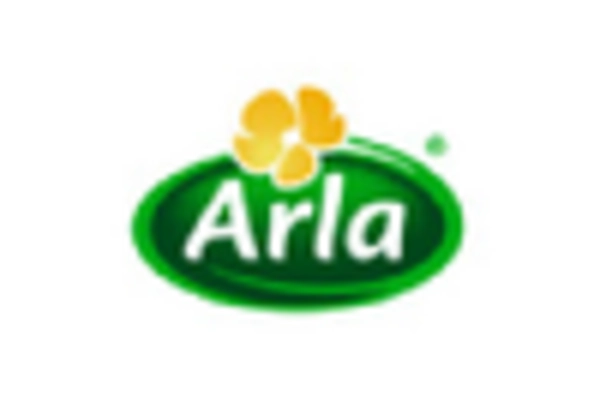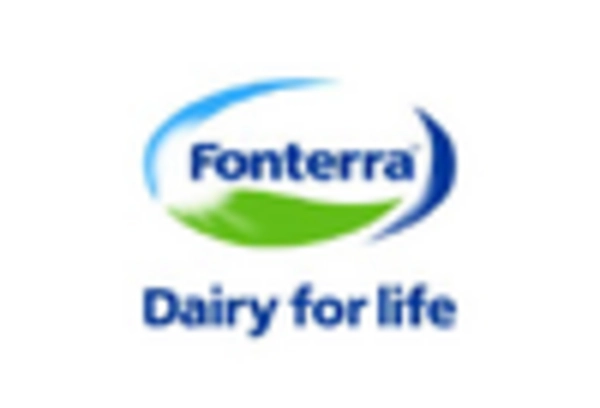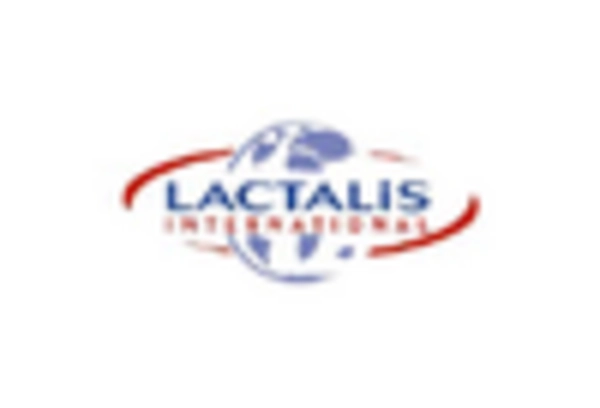Increasing Health Consciousness
The growing awareness of health and wellness among consumers in Argentina appears to be a significant driver for the milk protein market. As individuals increasingly prioritize nutrition, the demand for high-protein dairy products is likely to rise. This trend is reflected in the market, where the consumption of milk protein products has surged by approximately 15% over the past year. Consumers are seeking products that not only provide essential nutrients but also support fitness and weight management goals. The milk protein market is thus positioned to benefit from this shift, as manufacturers innovate to create products that cater to health-conscious consumers. This focus on health may also lead to the introduction of fortified milk protein products, further expanding the market's reach and appeal.
Emerging Trends in Food Fortification
The trend towards food fortification in Argentina is emerging as a key driver for the milk protein market. As consumers become more aware of nutritional deficiencies, there is a growing interest in fortified foods that provide additional health benefits. The milk protein market is likely to see an increase in the development of fortified milk protein products, which may include added vitamins, minerals, and other beneficial ingredients. Market analysis suggests that the demand for fortified dairy products could grow by approximately 18% in the coming years. This trend not only addresses consumer health concerns but also presents an opportunity for manufacturers to differentiate their products in a competitive market, potentially leading to increased sales and market penetration.
Government Support for Dairy Industry
Government initiatives aimed at supporting the dairy industry in Argentina are likely to bolster the milk protein market. Policies that promote dairy farming, enhance production efficiency, and provide financial assistance to farmers can positively impact the availability and quality of milk protein products. Recent data indicates that government subsidies have increased by 12% in the past year, which may lead to improved production capabilities and lower costs for consumers. The milk protein market stands to benefit from these developments, as enhanced production can meet the growing demand for high-quality milk protein products. Furthermore, government support may encourage research and development efforts, fostering innovation within the sector.
Growth of the Sports Nutrition Sector
The expansion of the sports nutrition sector in Argentina is driving demand for milk protein products. With an increasing number of individuals engaging in fitness activities and sports, the need for protein-rich supplements is becoming more pronounced. The milk protein market is witnessing a notable uptick in sales, with estimates suggesting a growth rate of around 20% in this segment over the last year. Athletes and fitness enthusiasts are turning to milk protein for its high biological value and essential amino acids, which are crucial for muscle recovery and growth. This trend indicates a robust opportunity for manufacturers to develop specialized milk protein products tailored to the needs of this demographic, potentially enhancing their market share and profitability.
Rising Popularity of Dairy Alternatives
The milk protein market is experiencing a shift due to the rising popularity of dairy alternatives among consumers in Argentina. While traditional dairy products remain a staple, the increasing demand for plant-based options is influencing market dynamics. This trend may lead to a diversification of product offerings within the milk protein market, as companies explore ways to incorporate both dairy and non-dairy protein sources. The market data suggests that the growth of dairy alternatives could potentially reach 10% annually, prompting traditional dairy producers to innovate and adapt. This evolution may create a competitive landscape where milk protein products are reformulated to appeal to a broader audience, including those seeking lactose-free or vegan options.
















